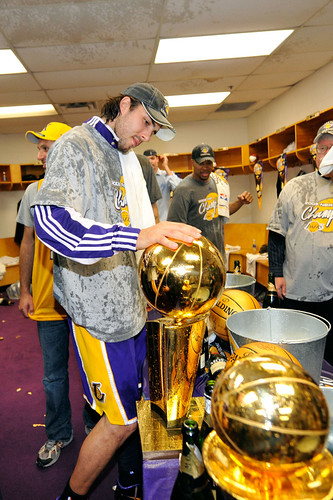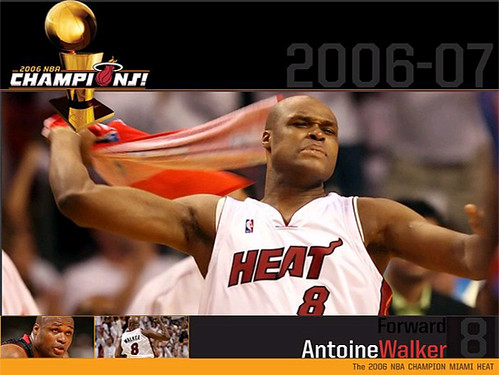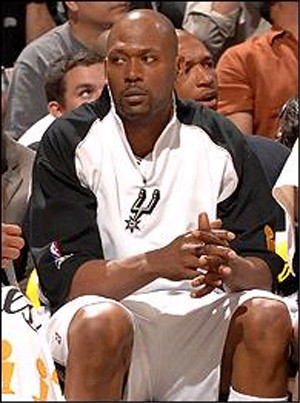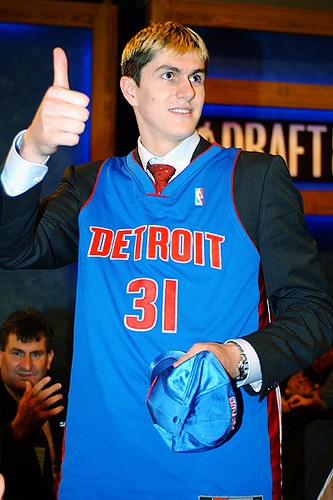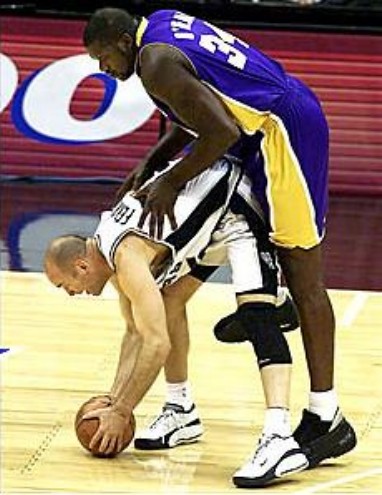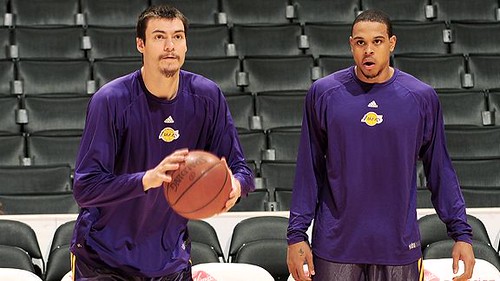
Let me state up front that I wanted this entry to be about Ron Artest. See, I'm still bitter. Still bitter that he couldn't keep it together when he was on the Bulls. And I'm very bitter about his time with the Pacers: Not only did the infamous Pacers-Pistons brawl he started ruin Indy's last serious shot at a title, he did it during Reggie Miller's final season. Then, after Pacers GM Larry Bird gave him a second chance, Ron-Ron began the season by asking for a couple months off to promote his rap album (his request was declined)...and then he demanded a trade (that request was granted).
The Pacers are still recovering, both financially -- they're losing about $30 million a year and the city of Indianapolis recently granted the team a $33 bailout just to keep them from leaving town -- and in terms of oncourt success. Seriously, it's starting to look like the Pacers may never be good ever again.
Thank you, Ron Artest. Thank you very much.
And yet I can't do it. I can't include Artest in my list of Worst NBA Champions. There are two reasons for this. First, he may well have been the difference between the Lakers winning the title or succumbing to their hated rivals. He didn't have a good playoffs -- his shooting was turrible (39% from the field, 29% in threes), he missed 16 of his 38 fouls shots, and he gave up 110 points per 100 possessions -- but he made crucial contributions in the Finals. Namely, slowing down Paul Pierce and hitting some key shots, particularly near the end of Game 7. It's not inaccurate to suggest the Lakers might not have won without him.
Secondly, there's ample reason to suggest that Artest really is batshit crazy. And as funny as it is when Ron freaks out and mistakes mushrooms in his yard for giant, deadly snake eggs, the reality seems to be that his struggles with mental health are both genuine and organic. Much as I hate to admit it, I actually felt something close to joy for the guy when he thanked his psychiatrist after the Lakers won the title. After all, here was a man who had escaped the hell of his own mind to achieve a very real, very public redemption.
As a Pacers fan, I hated him. As a human being, I applauded him.
So Ron gets a free pass this time around. Instead, I turn my attention to The 'Stache: Adam John Morrison.
I almost feel bad about picking on Morrison. God knows he's been picked on enough during his brief and highly unsuccessful NBA career. I say "unsuccessful" relative to the expectations placed on him. Of course, his so-called lack of success has earned him two NBA championships and almost $17 million in cold, hard cash. Man...I wish my epic fails were more like Morrison's.
Still, his fall from grace has been long, hard, and face-first into the giant Palm of Destiny. After all, he was a great player in college. Wait. Scratch that. He was a great scorer in college. During his third and final season at Gonzaga, he led the nation in scoring by averaging 28.1 PPG while shooting almost 50 percent from the field and nearly 43 from downtown. As Wikipedia recounts: "He had 13 games of 30-plus points, with five of them over 40. His scoring totals against teams in the "major" conferences are no less impressive; he averaged 28.5 points in 11 such games. On February 18, Morrison recorded a career high 44 (including 37 in the second half alone) points against Loyola Marymount Lions in a winning effort."
Dude could put the biscuit in the basket.
During his final game as a college student -- versus UCLA in the Sweet Sixeen -- Morrison led the Zags with 24 points. Unfortuantely for Adam, UCLA came back from a 17-point deficit and literally stole the game in the final seconds. Heartbreak City, baby. Before the game had even ended, Morrison started to cry. Then, when it was finally over, he flopped on the ground, pulled his jersey over his head, and wept like a wee little baby. Here's the entire spectacle:
It was an ugly scene. And as you could see, his tantrum prevented him from helping give his team a chance at the end...and he took some serious shit for it. Not enough to keep him from becoming an NBA lottery pick. But still.
Of course, there were legitimate concerns regarding his NBA prospects. He was slow. He was slightly awkward and not particularly athletic. Despite his size (6'8"), he didn't rebound very well (only 5.1 RPG for his college career and 5.5 during his final season). He didn't do much to make his teammates better either (to wit: during his final season at Gonzaga, he averaged about 20 FGA and almost 10 FTA but only 1.7 APG). And his ability make the transition to the pros was seriously questioned:
While Morrison’s dominance at the college level can’t be questioned, many still doubt how his game will translate to the next level. Morrison has a certain amount of deceptive quickness to his game, but is he a good enough athlete to be a star in the NBA?Despite the many doubts, Michael Jordan -- in one of his first acts as Manager of Basketball Operations of the Charlotte Bobcats -- made Morrison the third overall selection in the 2006 NBA Draft...ahead of guys like Brandon Roy, Rudy Gay and Rajon Rondo, not to mention a scad of other servicable roleplayers (J.J. Redick, Ronnie Brewer, Boobie Gibson, Paul Milsap, etc.).
With how hard Morrison has to work to get shots at the college level, can he create offense against the Ron Artests and Bruce Bowens of the NBA? While the caliber of defender guarding Morrison has made little difference during his time at Gonzaga, it remains to be seen whether he has the footspeed or overall athleticism to succeed as an all-around scorer at the next level.
The other hole in Adam Morrison’s game can be easily observed on the defensive end. Morrison clearly reserves most of his energy for his scoring expoits, and tends to coast on defense most of the time. Gonzaga will often switch into zone defenses so teams can’t exploit him on that end.
While Morrison has solid defensive instincts when he is focused, it is generally perceived that the lack of footspeed will really hurt in one-on-one situations on the defensive end. Morrison may very well be able to create his own shot in the NBA, but it is hard to see him being able to stay in front of the freak athletes occupying the wing position in the NBA. It is likely that whichever team ends up drafting Morrison will have to come up with a defensive gameplan that covers for Morrison’s shortcomings on that end.
Morrison's entry into the Association led to some semi-brilliant NBA Live commercials:
There was also one about his mustache that I can't figure out how to embed. Unfortunately, these commericals -- filmed before he had played a single NBA game -- turned out to be the best part of his entry into the league.
Morrison had a rough rookie season -- 11.8 PPG, 37% FGP, 33% 3P% -- and lost his starting job after only 23 games because of bad shooting and worse defense. By all accounts, Morrison spent the offseason working himself into terrific shape only to tear the ACL in his left knee during a preseason game, which forced him to sit out the entire 2007-08 season. When Adam returned for the the 2008-09 campaign, he had regressed (4 PPG, 35% FGP). It didn't help that the 'Cats new coach, Larry Brown, hated Morrison's defense and preferred strong drives to willowy three-pointers. At the trade deadline, he was shipped to L.A., where he passed out enough Gatorade and handed out enough clean towels during timeouts to become an NBA champion.
There were rumors Morrison might not return for the 2009-10 season, that the Lakers might trade him or buy out his contract. No dice. L.A. held onto him because, by all accounts, he was a hard worker and a diligent practice player. And ideal 12th man. But not a rotation player.
In all, Morrison appeared in only 31 games. He never played more than 16 minutes and 53 seconds. For the season, he took 85 shots and scored only 74 points. His season high was seven points. In 25 of his games, he scored five points or less. In 10 of his games, he didn't score at all. His shooting percentages were 37 percent from the field and 23 percent from beyond the arc.
His postseason contributions were even more limited. He appeared in exactly two first round playoff games: He logged four minutes in the Lakers' 110-89 Game 4 loss in Oklahoma City, and he put in eight minutes worth of work during L.A.'s 111-87 home win in Game 5.
And that was it. Those were his final minutes of PT as a member of the Lakers. When Morrison's contract expired this summer, Mitch Kupchak let him know his services were no longer required. He worked out with a few teams -- the Bulls and Celtics, for instance -- and it appears he might be hooking up with the Washington Wizards. Which, honestly, is great, because -- like I said -- he appears to be a focused, determined player who is well-liked by his teammates.
Just ask Kobe Bryant: "[The fact that Morrison couldn't crack the rotation] is a testament to our team, honestly, because Adam can really play. He can really, really go. For him to take a step back and to do things like that really helped us get to that championship level."
Considering how rarely Kobe doles out praise, that's really saying something. And it gets to the point of this post. Unlike some of the other Worst NBA Champions, Morrison wasn't a locker room cancer, or someone who put himself ahead of team goals, or someone who bragged about accomplishments he was barely a part of, or a huge douchebag. It seems he was a character guy who took his role with the team very seriously but simply wasn't good enough to keep his job.
Or even get in a real game.
No, Morrison wasn't a bad guy. He was -- and is -- a walking, talking, non-playing cautionary tale. He had a truly memorable college career, but he went bust in the NBA. It's not his fault. It's not like he didn't try. And I'm sure it's something that's pretty hard to take. It would have to be.
But he has a ring.
Update! Bonus video: Morrison's 2010 NBA Finals highlights (via Wild Yams):
